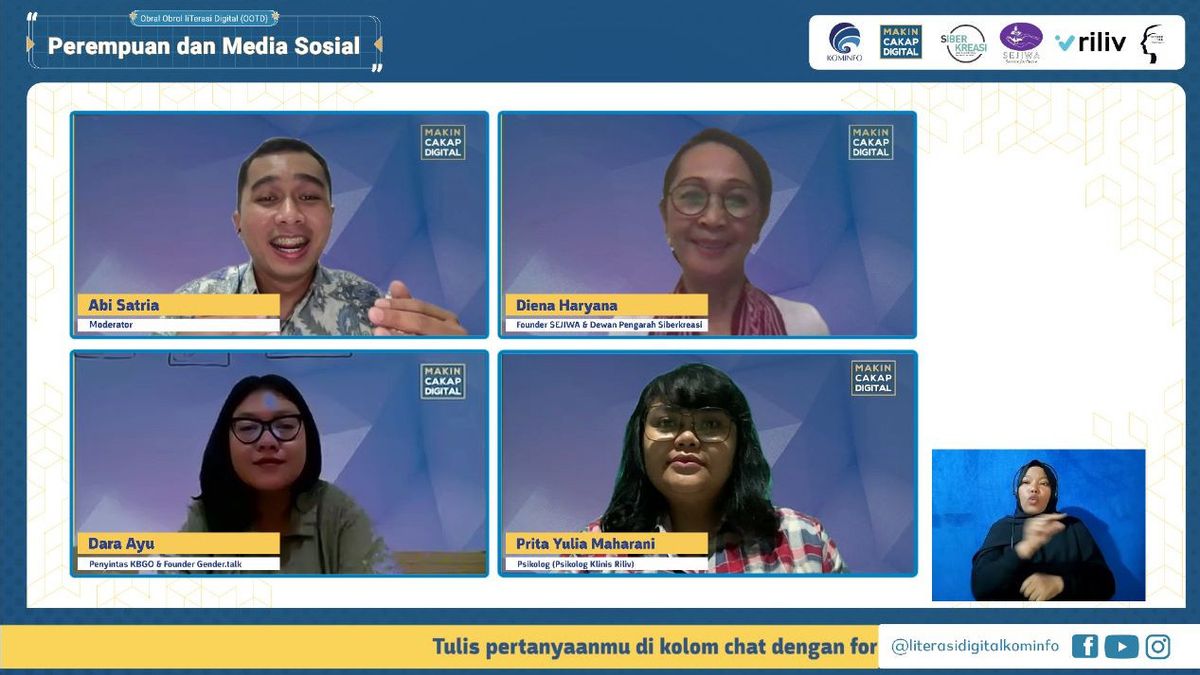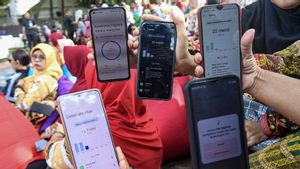JAKARTA - Digital media is currently a means or space for people and gender to communicate to get to know the world more widely through social media. Like a double-edged sword, in the midst of the wide internet network, the sophisticated development and spread of information technology and the popularity of the use of social media also presents a new form of online gender-based violence (KBGO).
There are several forms of online gender-based violence, such as approaches to outwit or cyber development, online harassment or cyber harassment, hacking or hacking, illegal or illegal content, violation of privacy or infringement of privacy, threat of distribution of personal photos or videos or malicious distribution, defamation of online defamation, and online recruitment.
Therefore, in order to welcome the day of international women, the Directorate General of Applications and Informatics of the Ministry of Communication and Informatics together with the Cybercreation GNLD held a Digital Literacy Obral Obrol (OOTD) with the theme Women and Social Media on Thursday, March 9, 2023.
OOTD this time was attended by speakers such as Diena Haryana Founder SEJIWA & Cybercreation Steering Committee, Dara Ayu KBGO survivors and founder Gender.Talk, and Prita Yulia Maharani Clinical Psychologist Riliv.
Women are more frequent and more vulnerable to violent victims including KBGO which is harmful to the mental health and psychology of their victims. KBGO can cause depression to excessive anxiety and behavioral changes so that it cannot be underestimated for many parties.
Diena Haryana, Founder of SEJIWA & Cybercreation Steering Committee, said that as a woman, she must act towards women who are victims by accompanying her through these difficult times. Because when a woman experiences violence there is anger, fear, disappointment, deep inner wounds,
"So we as women need to accompany him during the process he chose, either counseling or legal assistance," he explained.
As a KBGO survivor, Dara Ayu revealed that many women are even not aware of being included in the KBGO's potential domain. This is due to the comfort of, for example, when you have a partner, you will exchange social media passwords or smartphones with other people.
"There are so many, we don't realize that the photos sent can be booming. My advice is that sending photos or videos must pay attention to several things so that unwanted things don't happen. Like sending them to other media and to other people for the purpose of threats," Dara said.
Based on Safenet's report, in 2021 as many as 74 percent of KBGO will be experienced by women, while 8 percent will be experienced by men.
Prita Yulia Maharani Clinical Psychologist Riliv revealed that many victims started from dating apps, social media, and the campus environment and work.
"Starting with asking for a 'pap' with the consent of both parties voluntarily then when deciding to terminate the call, the paper can be used as a threat. Some victims even lead to violence against themselves when they feel depressed," explained Prita.
Komnas Perempuan has Friends of Women and Children Service (SAPA) in 129 which provides 6 main services for women victims of violence and children who need special protection, namely Complaints Services, Outreach Services, Case Management Services, Temporary Shelter Access Services, Victim Assistance Mediation Services, and Mental Health Services.
Untuk bisa terus mendapatkan informasi terup to date mengenai kegiatan Zoom Bareng dan kegiatan seru lainnya, dapat dilihat di info.literasidigital.id atau follow media sosial Literasi Digital Kominfo.
The English, Chinese, Japanese, Arabic, and French versions are automatically generated by the AI. So there may still be inaccuracies in translating, please always see Indonesian as our main language. (system supported by DigitalSiber.id)









